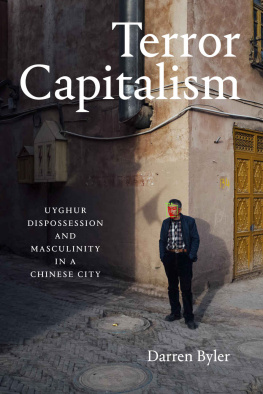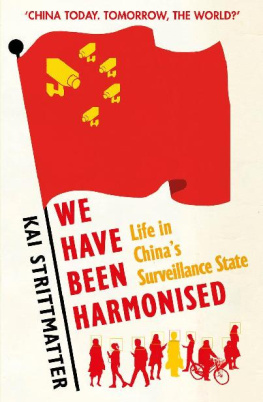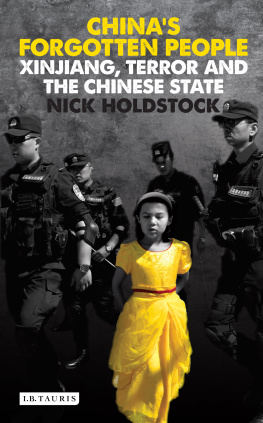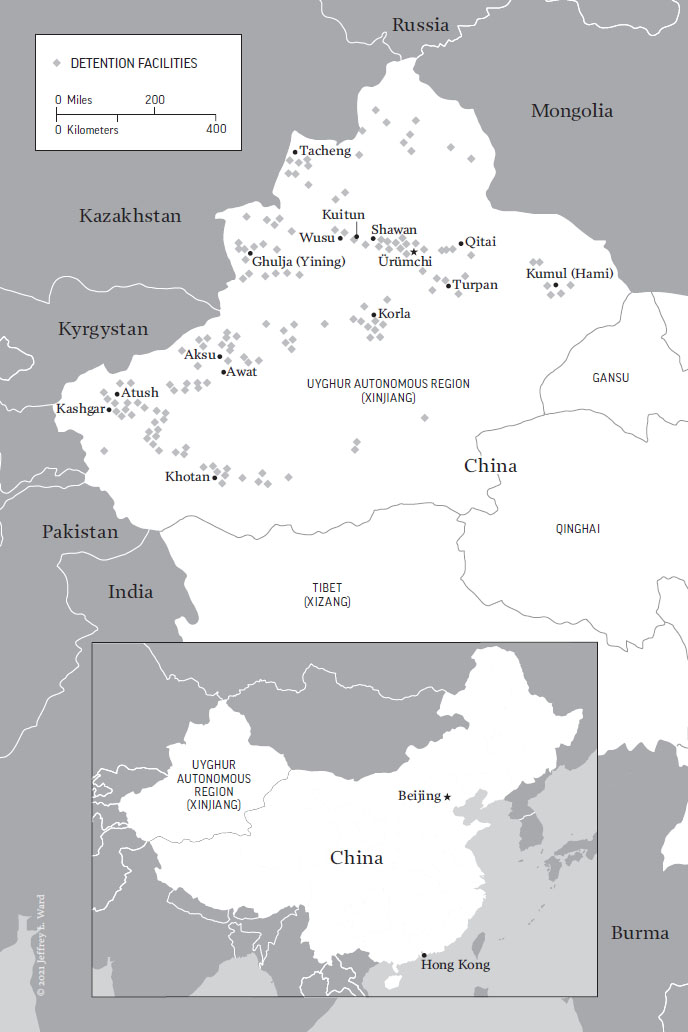In the Camps
Chinas High-Tech
Penal Colony
Darren Byler
In the Camps
Chinas High-Tech Penal Colony
Copyright 2021 by Darren Byler
All rights reserved
Published by Columbia Global Reports
91 Claremont Avenue, Suite 515
New York, NY 10027
globalreports.columbia.edu
facebook.com/columbiaglobalreports
@columbiaGR
Library of Congress Cataloging-in-Publication Data
Names: Byler, Darren, author.
Title: In the camps : Chinas high-tech penal colony / Darren Byler.
Description: New York, NY : Columbia Global Reports, [2021] | Includes bibliographical references.
Identifiers: LCCN 2021017638 (print) | LCCN 2021017639 (ebook) | ISBN 9781735913629 (paperback) | ISBN 9781735913636 (ebook) Subjects: LCSH:Internment camps--China. | Penal colonies--China. | Uighur (Turkic people)--China--Social conditions. | Electronic surveillance--China.
Classification: LCC HV8964.C5 B95 2021 (print) | LCC HV8964.C5 (ebook) | DDC 365/.4508994323051--dc23
LC record available at https://lccn.loc.gov/2021017638
LC ebook record available at https://lccn.loc.gov/2021017639
Book design by Strick&Williams
Map design by Jeffrey L. Ward
Author photograph by Darren Byler
Printed in the United States of America
CONTENTS
Introduction
Sometime in mid-2019, a police contractor tapped a young college student from the University of Washington on the shoulder as she walked through a crowded market intersection. The student, Vera Zhou, didnt notice the tapping at first because she was listening to music through her earbuds as she weaved through the crowd. When she turned around and saw the black uniform of a police assistant, the blood drained from her face even as the music kept playing. Speaking in Chinese, Veras native language, the police officer motioned her into a nearby Peoples Convenience Police Stationone of more than 7,700 such surveillance hubs that now dot the region.
On a monitor in the boxy gray building, she saw her face surrounded by a yellow square. On other screens she saw pedestrians walking through the market, their faces surrounded by green squares. Beside the high definition video still of her face, her personal data appeared in a black text box. It said that she was Hui, a member of a Chinese Muslim group that makes up around 1 million of the population of 15 million Muslims in Northwest China. The alarm had gone off because she had walked beyond the parameters of the policing grid of her neighborhood confinement. As a former detainee in a reeducation camp, she was not officially permitted to travel to other areas of town without explicit permission from both her neighborhood watch unit and the Public Security Bureau. The yellow square around her face on the screen indicated that she had once again been deemed a pre-criminal by the digital enclosure system that held Muslims in place. Vera said at that moment she felt as though she could hardly breathe. She remembered that her father had told her, If they check your ID, you will be detained again. You are not like a normal person anymore. You are now one of those people.
Vera was in Kuitun, a small city of around 285,000 in Tacheng Prefecture, an area that surrounds the wealthy oil city of Karamay, and forms the Chinese border with Kazakhstan. She had been trapped there since 2017 when, in the middle of her junior year as a geography student at the University of Washington (where I was an instructor), she had taken a spur-of-the-moment trip back home to see her boyfriend. Her ordeal began after a night at a movie theater in the regional capital rmchi, a city of 3.5 million several hours from her home, when her boyfriend received a call asking him to come to a local police station. At the station, the police told him they needed to question his girlfriend. They said they had discovered some suspicious activity in Veras internet usage. She had used a virtual private network, or VPN, in order to access illegal websites, such as her university Gmail account. This, they told her later, was a sign of religious extremism.
It took some time for what was happening to dawn on Vera. Perhaps since her boyfriend was a non-Muslim from the majority Han group and they did not want him to make a scene, at first the police were quite indirect about what would happen next. They just told her she had to wait in the station. When she asked if she was under arrest, they refused to respond. Just have a seat, they told her. By this time she was quite frightened, so she called her father back in her hometown and told him what was happening. Eventually, a police van pulled up to the station. Four officers piled out, three of them middle aged and one just a teenager, around the same age as Vera. On the sleeve of his uniform, it said assistant police, the term given for more than ninety thousand private security contractors hired by the police as outsourced labor during the reeducation campaign.










